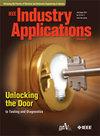BESS Assisted Off-Grid Wind Energy Conversion System Operated Under Adverse Battery-SoC Conditions
IF 4.5
2区 工程技术
Q2 ENGINEERING, ELECTRICAL & ELECTRONIC
引用次数: 0
Abstract
Wind Energy Conversion systems (WECS), supplying islanded microgrids, often incorporate a Battery Energy Storage System (BESS) as an energy-buffer. To ensure safety and long life, the battery-bank (BB) in such systems must not be overcharged or deep-discharged. This paper proposes a reconfigurable operational strategy for a doubly-fed induction generator (DFIG) based islanded WECS integrated with a BESS. When theBESS辅助离网风能转换系统在不利的电池soc条件下运行
为孤岛微电网供电的风能转换系统(WECS)通常包含电池储能系统(BESS)作为能量缓冲。为确保安全性和长寿命,此类系统中的电池组(BB)不得过度充电或深度放电。提出了一种双馈感应发电机(DFIG)与BESS集成的孤岛WECS的可重构运行策略。当BB的充电状态(SoC)接近最大限制时,转子侧转换器使用修改的电压控制器调节直流母线电压,同时操作远离最大功率点的DFIG。当BB- soc接近最小极限时,提出了一种基于最小消费者不适因素的减载策略,使BESS能够在不深度放电BB的情况下调节直流母线电压。在Opal-RT实时仿真环境中,对提供CIGRE住宅配电网基准的DFIG-BESS系统进行了仿真。与pi控制器和最新文献相比,该电压控制器在从BESS过渡到基于RSC的直流母线电压调节时,dfig1 -定子有功功率的欠冲降低了69.44%和46.66%,直流电压偏差降低了3.45%和99.83%。与文献中提出的类似策略相比,所提出的减载策略还显著降低了直流母线电压降。
本文章由计算机程序翻译,如有差异,请以英文原文为准。
求助全文
约1分钟内获得全文
求助全文
来源期刊

IEEE Transactions on Industry Applications
工程技术-工程:电子与电气
CiteScore
9.90
自引率
9.10%
发文量
747
审稿时长
3.3 months
期刊介绍:
The scope of the IEEE Transactions on Industry Applications includes all scope items of the IEEE Industry Applications Society, that is, the advancement of the theory and practice of electrical and electronic engineering in the development, design, manufacture, and application of electrical systems, apparatus, devices, and controls to the processes and equipment of industry and commerce; the promotion of safe, reliable, and economic installations; industry leadership in energy conservation and environmental, health, and safety issues; the creation of voluntary engineering standards and recommended practices; and the professional development of its membership.
 求助内容:
求助内容: 应助结果提醒方式:
应助结果提醒方式:


